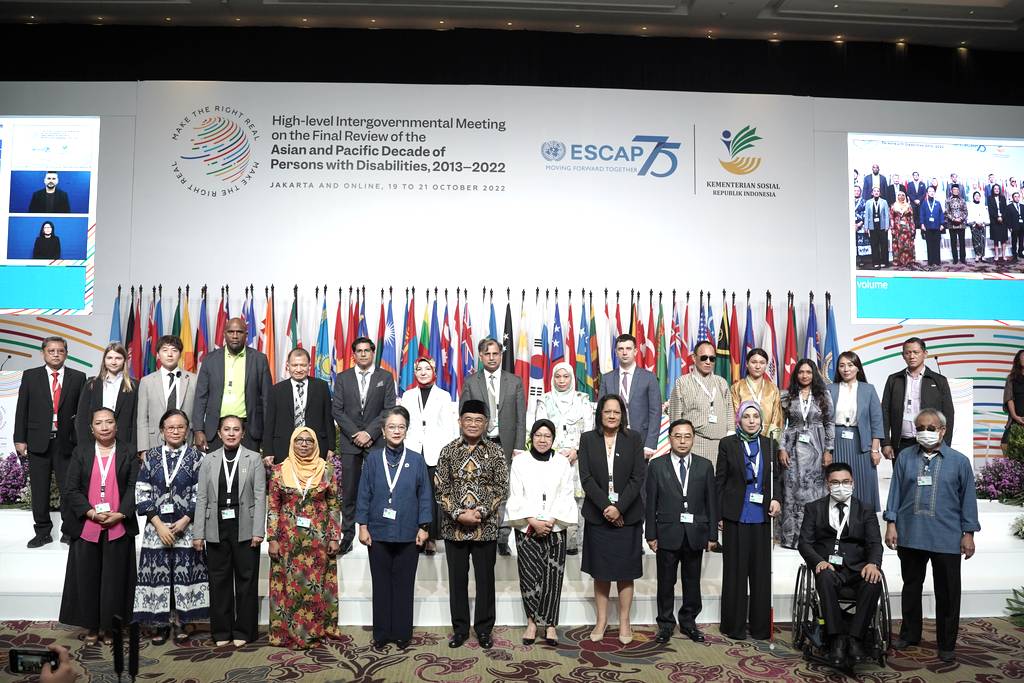
Overview
The High-level Intergovernmental Meeting on the Final Review of the Asian and Pacific Decade of Persons with Disabilities, 2013–2022 was successfully convened by the Economic and Social Commission for Asia and the Pacific (ESCAP) and hosted by the Government of Indonesia in Jakarta and online from 19 to 21 October 2022. The primary objective of the meeting was to undertake a comprehensive review of the progress made during the past decade, share good practices and foster a collective vision and strategic direction for furthering disability-inclusive development in Asia and the Pacific. The meeting resulted in the adoption of the landmark Jakarta Declaration on the Asian and Pacific Decade of Persons with Disabilities, 2023–2032. Emphasizing disability rights and promoting the meaningful participation of over 750 million persons with disabilities in the region, this historic Declaration calls for a gender-responsive life cycle approach to disability inclusion.
Prioritizing disability-inclusive development: key themes explored
During the three-day meeting, representatives from 41 Governments, 58 civil society organizations and 13 international organizations delved into innovative strategies to remove barriers faced by persons with disabilities. Recognizing the challenges and opportunities brought about by population aging, digital transformation and climate change, the meeting explored key priorities for disability-inclusive development in the region. These included, for example, strengthening the harmonization of national legislation with the Convention on the Rights of Persons with Disabilities, enhancing disability-inclusive social protection, promoting decent work and entrepreneurship opportunities, providing inclusive education for all learners with disabilities, ensuring disability-inclusive disaster risk reduction and management, and improving the reliability and comparability of disability data.
Advancing a whole-of-society approach and meaningful participation
United Nations Under-Secretary-General and Executive Secretary of ESCAP, Armida Salsiah Alisjahbana, highlighted the need for a whole-of-society approach to disability-inclusive development. She urged Governments to strengthen existing partnerships and forge new ones with organizations of persons with disabilities, the private sector and other stakeholders across sectors. Importantly, she stressed that the effective participation of diverse disability groups in policymaking and programming is essential for meeting the needs of persons with disabilities. The principle of “nothing about us without us” should be the foundation of all efforts in disability-inclusive development.
“Our policies should be developed and implemented with the full and meaningful participation of persons with disabilities. Let us give new life and meaning to the phrase 'nothing about us without us.”
---Armida Salsiah Alisjahbana,
United Nations Under-Secretary-General and Executive Secretary of ESCAP
Tri Rismaharini, the Minister of Social Affairs of Indonesia, also underlined the centrality of meaningful participation of persons with diverse disabilities in realizing the 2030 Agenda for Sustainable Development and meeting the pledge of leaving no one behind.
Charting the course for a more inclusive future
Despite notable policy advances over the past decade, persons with disabilities still encounter significant barriers in society. These challenges often manifest in unequal access to the labour market, limited educational opportunities and underrepresentation in political processes, among other areas. The adoption of the Jakarta Declaration reflects the region’s collective recognition of the significance of disability-inclusive development, marking a defining moment in the journey towards an inclusive and equitable Asia-Pacific region.
One of the prominent features of the Jakarta Declaration is its gender-responsive life cycle approach to disability inclusion. This approach acknowledges the intersectionality of disability, gender and age and the diverse experiences of persons with disabilities throughout their life cycle, calling for tailored support to respond to their specific needs and circumstances.
By adopting the Jakarta Declaration and proclaiming the fourth Asian and Pacific Disability Decade, ESCAP member States have laid the groundwork for a future that celebrates inclusion and diversity. To “make the right real” for all persons with disabilities in Asia and Pacific, it is time to join forces to translate commitment into action and catalyse positive change for the development of inclusive and sustainable societies where everyone benefits.
For more information on the Meeting, including its agenda, background documents and meeting report, please visit ESCAP’s dedicated web page.



